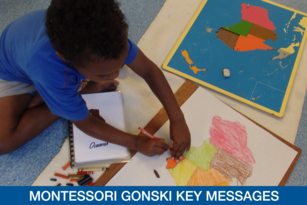Montessori Gonski Key Messages
Montessori Australia supports Gonski’s recommendation to place the learning growth of each student at the centre of our education model.
We view transformation of the current education model as an urgent priority and support evidence-based changes that provide students with the capabilities to flourish in the knowledge economy.
We offer the following key message as a contribution to this vital discussion. Our hope is that this conversation leads to more substantive changes so Australia does not miss this critical opportunity and can instead become known as the world’s leader in education innovation.
Transforming the industrial model
To better support teachers’ ability to differentiate learning and partner with students, other aspects of the current industrial-education model, such as, segregating students by grade, teaching subjects in isolation, and instruction and knowledge transfer, must also change.
Recommendations for education innovation:
- Multi-age classrooms
- Student-led rather than teacher-led learning
Developing self-regulated learning skills
Self-regulated learning is a key capacity for success in a knowledge economy. The current industrial-education model does not provide students with sufficient autonomy and time to effectively practice these skills.
Recommendations for education innovation:
- Individualised learning based on the student’s development level
- Utilising the interests of the student to facilitate engagement
- Preparation of learning environments to encourage opportunities for self-regulated engagement
- Open-ended time to learn
Developing a systems worldview
Teaching subjects in isolation is based on a mechanistic worldview that leads students to view problems of economy, society, and environment as discrete and solvable through reductionistic methods. We are in the midst of the “complexity turn”, which necessitates a systems worldview, essential to creative and critical thinking.
Recommendation for education innovation:
- Holistic curriculum with interdisciplinary learning
The developmental continuum of education
Any true innovation in education requires a model that understands how the brain develops, not a model based on factory efficiency that constrains students, teachers, and school leaders.
Recommendations for education innovation:
- Recognition that movement and cognition are linked, and that an education system needs to incorporate opportunities to regulate movement, thinking and emotions, and build executive functions
- Education begins at birth and continues and builds throughout life
Testing is not the true test
Gonski 2.0 assumes declining OECD PISA and stagnating NAPLAN literacy and numeracy scores indicate the potential of a future decline in Australia’s standard of living. However, some researchers point to an inverse relationship between PISA scores and entrepreneurial capabilities—capabilities that are directly related to a country’s economic success. Focusing on test scores could actually prevent Australia from fostering the very capabilities we want to develop.
Recommendations for education innovation:
- Reduced focus on comparative and academic testing
- Preparation of the learning environment to allow for ongoing feedback and self-assessment
- Measures that focus on the engagement and well-being of students, teachers, school leaders, families and communities
- Support at all levels so Australia can stay the course to be a world leader in education innovation
